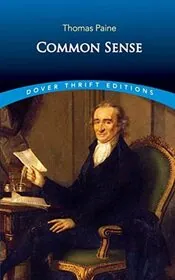Common Sense Summary
Author: Thomas Paine
This page offers our Common Sense summary (Thomas Paine's book). It opens with an overview of the book, and follows with a concise chapter-by-chapter summary.
Drafted with AI assistance and reviewed by a human editor.
As an Amazon Associate, we earn from qualifying purchases (at no extra cost to you).
This book has 1 recommender!
Overview
The discourse commences with a distinction between society and governance. Society symbolizes the positive and constructive accomplishments achieved through collective human efforts. In contrast, governance is seen as a necessary evil, established to safeguard us from our own flaws. Its origins stem from human misconduct and its primary function is to protect life, liberty, and property. The efficacy of a government should be evaluated based on its success in fulfilling this objective.
The narrative then transitions to a hypothetical scenario where a group of individuals are isolated on an island. Over time, these individuals form relationships, leading to the inevitable establishment of law. The argument posits that such individuals will experience greater satisfaction if they are actively involved in the law-making process. The narrative further criticises the British governing system, underlining its complexity, contradictions, and the disproportionate power it affords to the monarch. Despite a facade of checks and balances, the British system is deemed inadequate.
The discussion proceeds to the concepts of monarchy and inheritance of power. All humans are born equal, hence the division between ruler and subject is unnatural. Paine asserts that monarchy is a sinful practice condemned by the Bible and God. The narrative brings to light the pitfalls of hereditary succession, such as inept rulers, corruption, and civil war. The narrative then transitions to the American situation. The argument refutes the idea that America's prosperity under British rule justifies ongoing allegiance. It asserts that America has matured and no longer requires Britain's support. Furthermore, the argument suggests that America would fare better in commerce with Europe as an independent entity and remaining attached to Britain could lead to recurring issues from the past. Finally, the narrative endorses a representative democracy for the independent colonies and encourages America to break free from Britain to gain respect on the international scene. As an independent nation, America would be able to forge substantial alliances with other countries and seek their aid in the struggle for freedom.
Edited by
Software engineer whose passion for tracking book recommendations from podcasts inspired the creation of MRB.
Lead investor at 3one4 Capital whose startup expertise and love for books helped shaped MRB and its growth.







Comments
Did we miss something? Have feedback?
Help us improve this page by sharing your thoughts